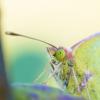Sorry, didn't mean to be insulting.
If you have evidence showing that selenomethionine has a greater cancer protective ability, feel free to post it. In the meantime...
I did not say that is has a greater cancer protective ability per se. All I said was that it has a
much higher toxicity and that it is not the form naturally found in selenium-rich food. Most reports on selenium toxicity are from the ingestion of inorganic forms (including
neurotoxicity at chronic intake levels much lower than previously thought), while even Brazilian populations eating brazil nuts as a dietary staple and thus having extremely high blood levels of selenium
haven't shown any obvious signs of selenosis.
Organic, protein bound selenium is the form nature provides and we have evolved to handle. We can't handle high doses of inorganic forms very well, because we rarely ever had to deal with them during evolution.
Inhibition of the in Vitro Growth of Human Mammary Carcinoma Cell Line ( MCF-7 ) by Selenium and Vitamin E
http://www.yumpu.com...carcinoma-cell-
"In both protocols, a relatively higher inhibitory potency of sodium selenite over selenomethionine was obvious"
Of course sodium selenite has a higher inhibitory potency in vitro, because it generally has a much higher cytotoxicity, not only for cancer cells. You have to be very careful in interpreting the results of in vitro studies, especially when dealing with such toxic compounds.
Dietary supplementation of selenomethionine reduces metastasis of melanoma cells in mice
http://ukpmc.ac.uk/a...ct/MED/10368696
In this study, mice treated with selenite had fewer metastatic tumors than mice treated with an equivalent amount of selenium as selenomethionine.
If selenium has an inhibitory effect on melanoma is this strain of mice it is only logical that selenite acts more potently, because the bioavailability of inorganic forms is higher. Both forms are metabolized into the body's own selenoproteins, but inorganic forms seem to largely bypass the regulatory mechanism for selenium homeostasis and therefore are more potent and carry a much higher risk of toxicity.
Long article suggesting that the best choice is to ensure high levels of 3 major forms of selenium.
Life Extension Magazine articles, while providing some valuable information, are mostly serving the purpose of providing a sales-pitch and reassuring LEF customers of the safety and usefullness of the supplements they buy from them. They are hardly objective.
This is the
most recent and comprehensive review of selenium and cancer. It is quite sobering. The bottom line is that while low-dose selenium supplementation may provide benefits for poeple with low baseline selenium levels, higher dose supplementation seems actually more likely to promote cancer growth than to reduce it.
Moreover, there are a concerns that selenium (particulary in its in inorganic forms) might increase the risk of
diabetes and
amyotrophic lateral sclerosis.
Edited by timar, 19 December 2013 - 08:30 PM.





















































